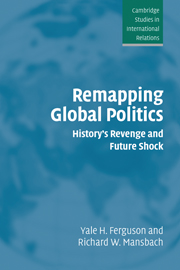Book contents
- Frontmatter
- Contents
- Preface
- Acknowledgments
- 1 Postinternational politics
- 2 Theory and method
- 3 Political space and time
- 4 States and other polities
- 5 Identities in a postinternational world
- 6 A postinternational world economy
- 7 War in a postinternational world
- 8 Technology and change
- 9 The future
- Index
- CAMBRIDGE STUDIES IN INTERNATIONAL RELATIONS
3 - Political space and time
Published online by Cambridge University Press: 22 September 2009
- Frontmatter
- Contents
- Preface
- Acknowledgments
- 1 Postinternational politics
- 2 Theory and method
- 3 Political space and time
- 4 States and other polities
- 5 Identities in a postinternational world
- 6 A postinternational world economy
- 7 War in a postinternational world
- 8 Technology and change
- 9 The future
- Index
- CAMBRIDGE STUDIES IN INTERNATIONAL RELATIONS
Summary
The confusion of territory with political space by international relations theorists has seriously limited their recognition of profound changes in global politics. Political space refers to the ways in which identities and loyalties among adherents to various polities are distributed and related, and territorial space is only one of the possibilities. Conceptualizing space as exclusively territorial and contemplating time as though it were distinct from space reflect what Jonathan Boyarin calls “close genealogical links between the ‘Cartesian coordinates’ of space and time and the discrete, sovereign state, both associated with European society since the Renaissance. These links include relations of mapping, boundary setting, inclusion, and exclusion.”
Political space can actually be organized in many other ways than territory, and new technologies are facilitating reorganization. During Europe's Middle Ages, as well as in the run up to the Treaties of Augsburg and Westphalia, political, military, and economic power was tied to landed holdings. This fact, plus the presence of a large number of independent states in a relatively small area, help explain why the continental power tradition flourished in both theory and practice. As its connection with actual land decreased in importance, the concept of space also changed, until today territory remains only one of many ways to define the extent of a polity's domain, that is, the political space that it occupies.
The parting of space and time
Consider what the following have in common or, as Rosenau asks with regard to individual cases, “of what is this an instance?”
- Type
- Chapter
- Information
- Remapping Global PoliticsHistory's Revenge and Future Shock, pp. 67 - 106Publisher: Cambridge University PressPrint publication year: 2004

